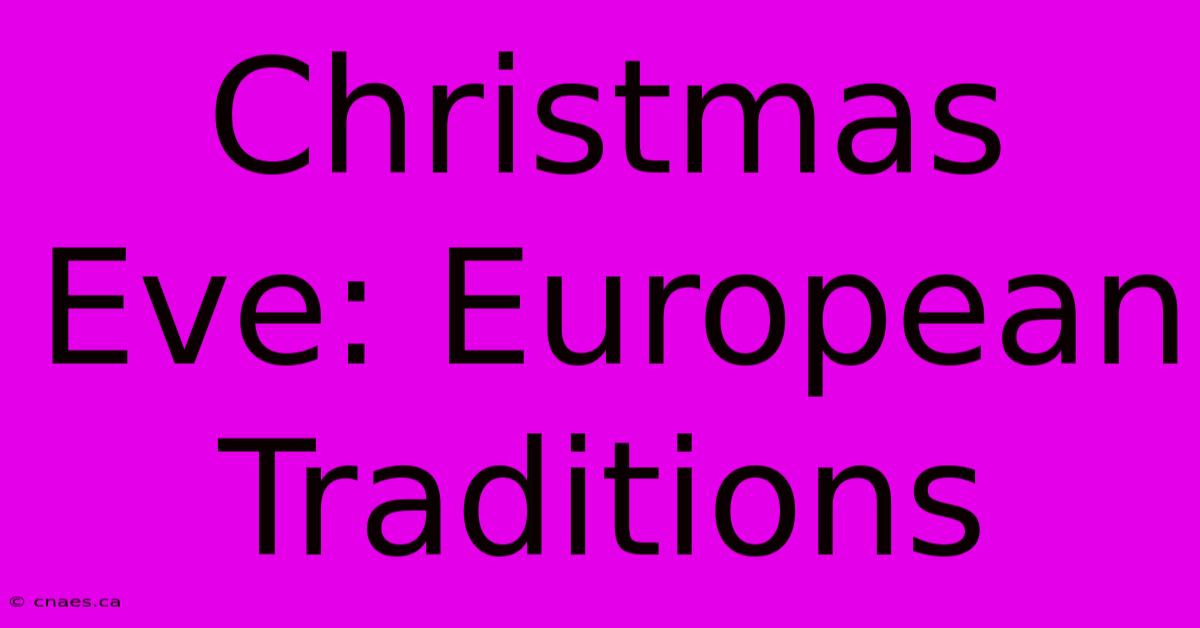Christmas Eve: European Traditions

Discover more detailed and exciting information on our website. Click the link below to start your adventure: Visit My Website. Don't miss out!
Table of Contents
Christmas Eve: European Traditions – A Festive Journey Across the Continent
Christmas Eve, the night before Christmas Day, is a time of anticipation, family gatherings, and unique traditions that vary widely across Europe. While the spirit of Christmas remains consistent, the customs and celebrations reflect the rich tapestry of European cultures. Let's embark on a festive journey to explore some of the captivating Christmas Eve traditions across the continent.
A Feast for the Senses: Culinary Delights on Christmas Eve
Food plays a central role in many European Christmas Eve celebrations. The Christmas Eve meal often holds special significance, reflecting regional specialties and family recipes passed down through generations.
Poland's Wigilia: A Vegetarian Feast
In Poland, Wigilia, the Christmas Eve supper, is a strictly vegetarian affair. The meal is traditionally served after the first star appears in the sky, symbolizing the Star of Bethlehem. Dishes like barszcz czerwony (red borscht), pierogi (dumplings), and karp po żydowsku (carp in a sweet and sour sauce) grace the table, reflecting the abundance and richness of the Polish culinary heritage.
Spain's Nochebuena: A Grand Family Gathering
In Spain, Nochebuena, Christmas Eve, is a time for elaborate family feasts. The meal typically features seafood, such as seafood paella or gambas al ajillo (garlic shrimp), alongside traditional roasted meats and hearty stews. The festive atmosphere extends beyond the dinner table, often including midnight mass and lively gatherings afterward.
Italy's Festive Feast: Regional Variations
Christmas Eve in Italy boasts a diversity of culinary traditions, influenced by regional variations. From the seafood-focused menus of coastal regions to the heartier dishes of inland areas, Italian Christmas Eve dinners are a true reflection of the country's gastronomic richness. Seven Fishes is a common theme, representing the seven sacraments of the Catholic faith.
Beyond the Feast: Traditions and Customs
Christmas Eve in Europe involves much more than just a delicious meal. Numerous captivating customs and traditions enrich the festive experience.
The Christmas Tree: A Symbol of Hope and Joy
The tradition of decorating a Christmas tree is widespread across Europe, though the specific decorations and the timing of its placement may vary. Many families decorate their trees on Christmas Eve, creating a magical atmosphere that permeates the entire home.
Midnight Mass: A Spiritual Celebration
Attending midnight mass is a significant part of Christmas Eve for many Europeans. Churches are filled with worshippers, singing carols and celebrating the birth of Christ in a deeply spiritual atmosphere. This religious element adds a profound dimension to the festive season.
Gift-Giving Traditions: Variations Across Europe
While gift-giving is a common Christmas tradition, the timing and specific customs differ across Europe. In some countries, gifts are exchanged on Christmas Eve itself, while in others, the tradition is reserved for Christmas morning.
Strengthening Family Bonds: The Heart of Christmas Eve
Regardless of the specific traditions, Christmas Eve in Europe is a time for families to gather, strengthening bonds and creating lasting memories. The sharing of meals, the exchange of gifts, and the participation in religious or secular celebrations all contribute to the spirit of unity and togetherness that defines this special night.
Conclusion: Embracing the Diversity of European Christmas Eve
Christmas Eve in Europe is a vibrant tapestry of traditions, showcasing the diverse cultural heritage of the continent. From the elaborate feasts to the spiritual celebrations, each country and region boasts unique customs that add to the richness and enchantment of the festive season. This exploration only scratches the surface of the many fascinating Christmas Eve traditions across Europe, encouraging further exploration and appreciation of the diverse cultural expressions of this beloved holiday.

Thank you for visiting our website wich cover about Christmas Eve: European Traditions. We hope the information provided has been useful to you. Feel free to contact us if you have any questions or need further assistance. See you next time and dont miss to bookmark.
Also read the following articles
| Article Title | Date |
|---|---|
| De Minaur Boulter Tennis Power Couple | Dec 24, 2024 |
| Before Squid Game Important Info | Dec 24, 2024 |
| Guardiola Denies Man City Fights | Dec 24, 2024 |
| Montreal Loses Close Game | Dec 24, 2024 |
| Christmas Eve Target Walmart Open | Dec 24, 2024 |
